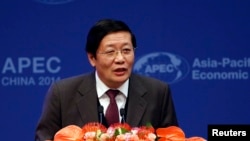APEC finance ministers met this week in Beijing seeking points of cooperation amidst a slowing Chinese economy. The economic cool down is already impacting other countries in Asia.
After decades of rapid economic growth, China’s economy is slowing down. This was top of the of agenda for APEC finance ministers who met this week in Beijing. At the close of their meeting, China’s Finance Minister Lou Jiwei said Asia would have to lead a global economic recovery.
He said the Asia Pacific region was a locomotive of global economic growth. He said that all of the finance ministers agreed to implement economic policies that supported growth and creation of jobs and are committed to structural reforms that would correct the weakness of current economic development.
Those structural reforms are changes China’s leaders have promised in this new, more measured, chapter of the country’s economic growth. China’s gross domestic product increased by 7.3 percent in the third quarter. While that rate still makes China the fastest growing economy in the world, it is the slowest growth China has had since the economic crisis of 2009.
Lou said increased trade and investment in infrastructure projects would be key to keeping Asian economies afloat. This week’s meeting is a prelude to an APEC summit on November 10 and 11 when leaders of the 21 APEC countries and U.S. President Barack Obama will convene in Beijing.
Resident Scholar at the Carnegie Tsinghua Center for Global Policy Shi Han said job creation remained a key concern for Chinese leaders.
“I think the paramount threat is still unemployment and that is still the issue in the backdrop of the overcapacity of the industries and too much money that has been borrowed by the companies and the government, and also the rising distribution issue of the income gap between the rich and the poor,” said Shi.
Earlier this year, Prime Minister Li Keqiang said slower growth was part of the Chinese government plan to emphasize reform over rapid economic development. He and other government leaders pledged to reduce government debt and increase domestic consumption. But Shi said that promise has yet to be realized in China’s economic data.
“Chinese manufacturers want to retain their advantage, and currently the exporting sector is picking up. The consumer spending, however, remains sluggish,” said the scholar.
China’s weakening economy may cause it to miss its target of 7.5 percent annual growth. If that happens it will be the first time China misses its growth target in 15 years.




